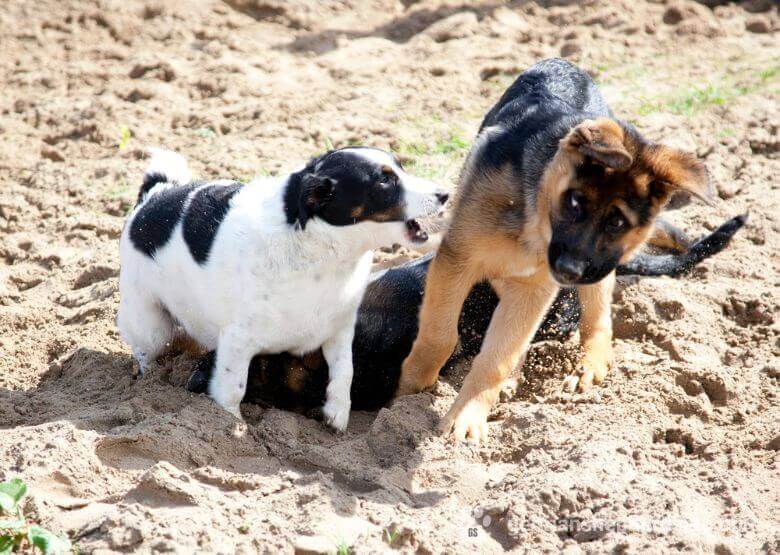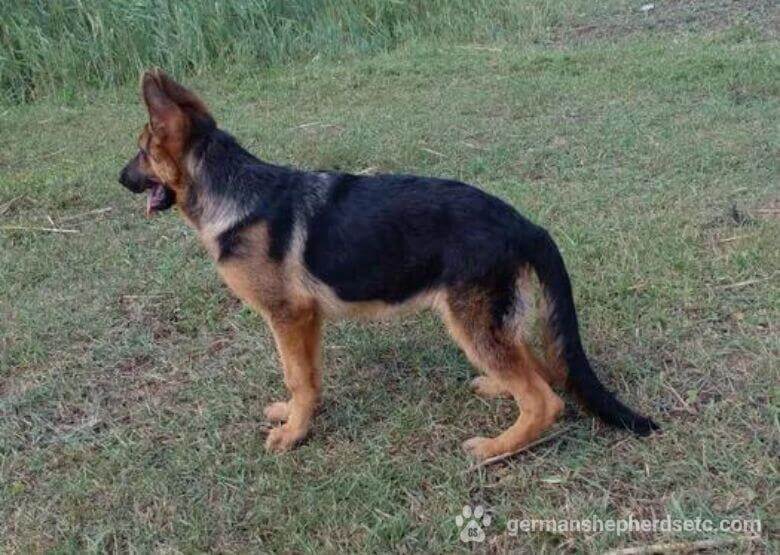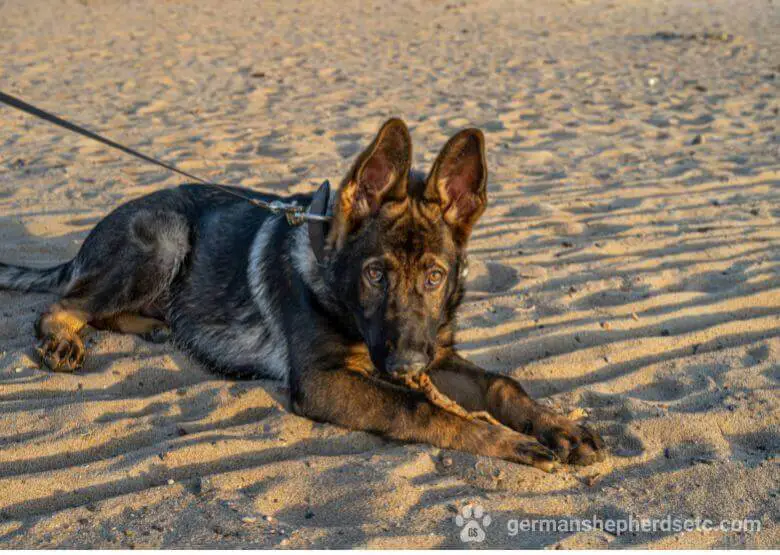Table of Contents
It is important to know that a 4 month old German Shepherd differs from a puppy of an earlier age. Here, we want to tell you about these differences, about the changes in diet, exercise, and interaction with people and other animals.
Size & Appearance
This age is a juvenile stage of the puppy’s development. These doggies are very cute but they do not look like young puppies anymore. They are pretty massive animals that overgrow one foot of height. The 4 month old German Shepherd weight is actually half of the adult dog’s weight. It is about 35-40 pounds (16-18 kg) for males and 31-35 pounds (14.5-16 kg) for females. It means that a puppy gained another 10 pounds during the last month.
The puppy grows rapidly. Your boy can be 11-14 inches (28-35 cm) and the girl 10-12 inches (25-30 cm) at the shoulder.
The coat has changed. They start shedding a lot like an adult dog, too. So, it is very important to brush them regularly – everyday brushing is necessary during this period. The skin is rather sensitive, so loose hair can cause allergies when it contacts the skin and the air.
Teething continues. Adult teeth are replacing the milk ones. That is the process lasting for 3-4 more months. The ears start perking up. Though, they are not stably erect at this age. The ears also can perk up and then fall and lay flat. It is a norm. Puppies at this age do not have strong cartilage. It will strengthen at the age of 5-6 months.
However, if your puppy lives in an environment with very loud sounds, its ears can flatten out because the noise does not allow them to perk up. That’s why if you like to listen to loud music or your home is full of sharp sounds, try to avoid exposing your doggy to them.
Activity & Behavior

A 4 month old German Shepherd puppy is a high-energy animal that needs a lot of physical and mental exercise. You should do obedience training, a lot of walking and jogging, playing in the backyard, and other activities.
Your puppy already knows that it should be protective of the members of your family. However, it can bark a lot because it is time to develop its vocal cords. Teach it not to do this so much.
It is very easy to train a 16 week old German Shepherd puppy because it has a strong desire to please you. Remember that you need strict discipline because your pet can display signs of disobedience at this age as any teenager does.
Your 4 month old GSD sleeps about 18 hours per day. Though, the number of hours can depend on the environment because it does not sleep so much if it has many things around to explore. If your pet has a lot of exercise during the daytime, it will sleep fast throughout the night and won’t wake you up for potty or playing. Nevertheless, some puppies prefer short naps in the daytime too. They won’t last long – just 15-20 minutes.
In any case, let your pet have a good rest. If it doesn’t get enough of it, you may notice some behavioral problems appear – they become more excited, depressed, or bark a lot. Discuss these changes with your veterinarian to pick out the most appropriate daily schedule for better rest.
Your puppy can walk effortlessly for about a mile (1.6 km). It is always ready to go outside and accompany you wherever you may go. Though, do not overload it with walking. Several walks during the day are a better option.
The German Shepherd needs a lot of exercise at this age – it’s an axiom. It should get about 2 hours of active playing every day.
The puppy learns a lot during its first four months. Everything seems an adventure to it. It is an exciting experience for both your doggy and you. Though, its behavior can be a bit unpredictable at times. So, you need to control it.
Health & Care

German Shepherds at this age can hold their bladders for about 4 hours, and if this period is shorter, you may need to talk to your vet.
In general, your 4 month old GSD puppy is entirely healthy, and it continues growing quickly. You need to weigh and measure your pet every time you come to the vet, or you can do it yourself at home. You may also need to get a DNA test to know what health issues to expect from your doggy when it is over 5 years old.
This age is the proper time for having the third set of vaccines because they have had the first two already. The third set includes DHPP and rabies.
Even if your puppy is healthy and active, you need to continuously watch out for possible disorders. You need to show your puppy to the vet, if you notice such things as changes in behavioral and sleeping patterns, sneezing and coughing, runny eyes or nose, losing weight, decrease in appetite, and other digestion issues, such as diarrhea or vomiting, red and swollen gums, heavy breathing, and excessive urination. These symptoms may mean severe health issues, so you need the veterinarian’s help immediately.
Keep your doggy clean and protected. You do not need to bathe it very often – it can be harmful to the production of the natural oils that protect the skin. However, your puppy’s bedding and bowls should always be clean to prevent the appearance of mites and other insects.
Brush your puppy every day now because of its excessive shedding. This is connected with the change of the coat from the puppy to an adult one. Grooming and brushing are very important parts of the care. If you don’t know how to do it and some other procedures, ask your veterinarian. You may also need the help of special grooming salons.
Feeding
Your 4 month old GSD is a good eater because it grows a lot. It should be fed not fewer than 3 times a day. It should take 1-2 cups of kibble of natural food per meal. At the end of the fourth month, you can start the transition to two feedings per day. Do not rush to switch your pet to adult food. You can do it only when it is 6-month-old when its growth slows down a bit.
You can also offer your GS puppy some treats. 3-5 small snacks are enough. Never give your puppy human food or human treats – the latter is rather dangerous and can cause severe health issues. Avoid overfeeding, too. Your dog should not suffer from obesity when it is an adult because there are bad health conditions caused by it.
If you decide to feed your puppy a natural raw diet, be careful about its nutritious value and high quality. It can consist of meats, vegetables, and fruits, but nothing fatty and toxic like junk food.
Training

There are several behavioral problems that you need to handle. The first of them is, of course, potty accidents in the home. Unfortunately, such accidents are pretty common at this age. You need to train your pet to do all its business outdoors. Since German Shepherds are very clever, it will understand very soon what you want from it. You need to be patient and persistent, though. Never show irritation or anger when an accident happens. You need to be encouraging if your puppy does everything correctly during its potty walks, but never punish it if something has gone wrong.
One more unpleasant thing at this age is biting and nipping your hands or feet. You need to control it while playing to prevent the formation of a biting habit. Never scream or shout at your pet when it bites you. Your little one can be frightened, and the problem may become worse over months. Just say ‘no’ in an authoritative voice. It will let your puppy know that it is doing something wrong.
Chewing furniture or things around can also be frustrating. Your puppy is teething, so it is a common thing now. Chewing helps it remove the milk teeth easily. Keep most things in your house out of its reach. Buy some chew toys, for example, a rubber bone or ball to discourage chewing things.
A 4 month old German Shepherd puppy can bark excessively at all unknown or suspicious objects. Barking all the time can become a serious issue for you and your pet over time. Teach your doggy not to bark at something unfamiliar. Don’t think that it displays its aggression. It only means that your pet needs more training and socialization.
FAQ
How big is a 4 month old German Shepherd?
Your Shepherd dog at this age does not look like that cute fluffy toy-like cub you once saw and liked. It begins to shape as an adult dog. Now, it continues to grow rapidly. So, the males can be 11-14 inches (28-35 cm) and the females grow as tall as 10-12 inches (25-30 cm) at the shoulder.
How much should a 4 month old German Shepherd weight?
Follow the weight of your pet by measuring it regularly. The puppies at this age grow very fast, so they tend to overeat. You should give your pet so much food to let it grow healthily and free from obesity. Therefore, the 4 month old GSD weight should be half of the adult dog’s weight. Your boy will weigh about 35-40 pounds (16-18 kg), and the girl’s weight is 31-35 pounds (14.5-16 kg). You can see that your doggy has gained about 10 pounds since the previous month.
How much should a 4 month old German Shepherd eat?
Your puppy should eat 1-2 cups of kibble per one meal three times per day. It grows very fast, so it needs a lot of nutrients and minerals for its ears, teeth, and coat. If you feed it natural food, you can add some supplements for puppies to its meals. You should also give your puppy some treats, but be careful not to give it more than 10% of all its day’s food.
How far can a 4 month old German Shepherd walk?
It’s surprising but your little pup can walk for about a mile (1.6 km). However, it does not mean that you need to walk it for such a distance every time. Consider two walks of half an hour per day if you want your puppy to grow healthy and strong, and develop all its perfect physical characteristics.
Final Thoughts
You can see that raising a 4 month old German Shepherd puppy and taking care of it is a responsible and complicated task. You need to know all the peculiarities of this age, so we hope that this article will help you.
You should be very patient and persistent to train your dog, do a lot of exercises with your pet, socialize it, and make friends with it. In a while, you will obtain the most loyal, intelligent, and protective friend for your family and yourself.
